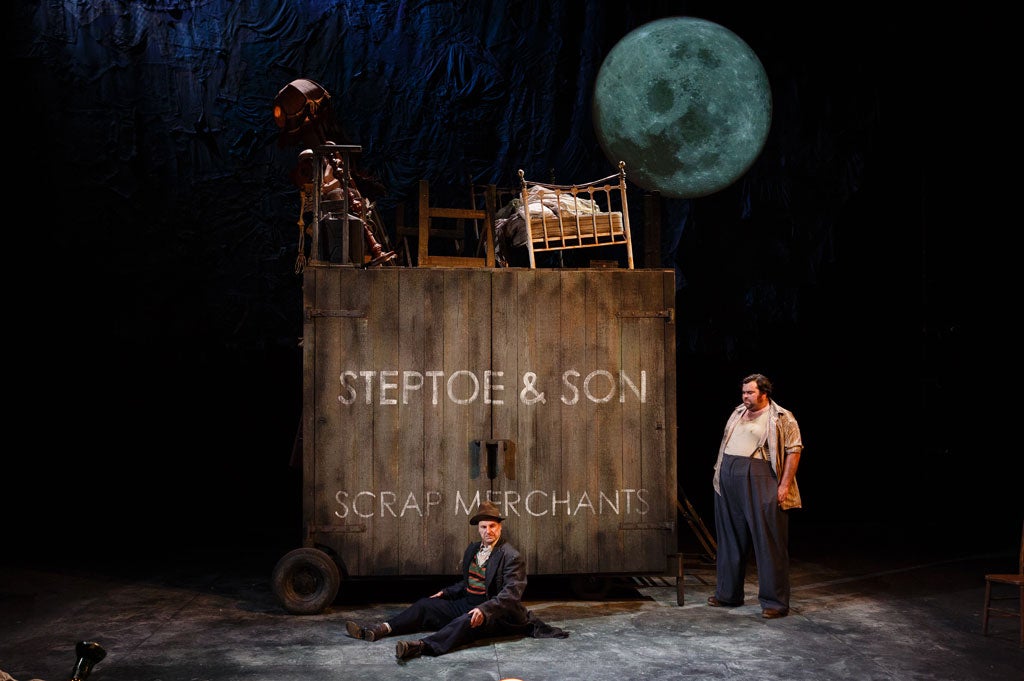Steptoe & Son, Kneehigh Theatre/ West Yorkshire Playhouse, Leeds

Your support helps us to tell the story
From reproductive rights to climate change to Big Tech, The Independent is on the ground when the story is developing. Whether it's investigating the financials of Elon Musk's pro-Trump PAC or producing our latest documentary, 'The A Word', which shines a light on the American women fighting for reproductive rights, we know how important it is to parse out the facts from the messaging.
At such a critical moment in US history, we need reporters on the ground. Your donation allows us to keep sending journalists to speak to both sides of the story.
The Independent is trusted by Americans across the entire political spectrum. And unlike many other quality news outlets, we choose not to lock Americans out of our reporting and analysis with paywalls. We believe quality journalism should be available to everyone, paid for by those who can afford it.
Your support makes all the difference.The last episode of Ray Galton and Alan Simpson’s Steptoe & Son was broadcast on Boxing Day 1974. From the early 60s its seven series revolutionised British comedy - giving it a darker, more actorly and socially observant twist as well as plenty of old fashioned laughs.
It also provided a platform for Harry H Corbett and Wilfrid Bramble to fashion two of the finest comic performances ever witnessed on the small screen. Yet though regularly repeated since, the rag and bone men locked together in their spirit-crushing embrace of grot and frustration have never achieved the tea time family appeal of a Dad’s Army or the Good Life – two sitcoms for which they paved the way.
Still the weight of expectation surrounding this adaptation by Kneehigh Theatre has been considerable. Unfortunately the first impression fails to live up to the high hopes. The Steptoes of Oil Drum Lane, Shepherds Bush are London creatures through and through and Mike Shepherd (Albert) and Dean Nolan’s (Harold) West Country accents jar.
The use of extended music-scenes to place the action in the swinging 60s becomes overbearing, slowing the pace so that at times it appears that the dramatic momentum might cease all together. The structure of the show is straightforward: four cut down scripts taken quite faithfully from the TV heyday.
The first – The Offer, formed the initial pilot, the success of which led to further commissions for the two writers then riding high on their winning association with Tony Hancock. Director Emma Rice selects two more episodes from the 1962 first series – The Bird and The Holiday, before rounding off the evening with the an episode from 1970, entitled Two’s Company.
Rice’s main contribution is the addition of a female character – the Woman, played by Kirsty Woodward, who at times is merely an observer whilst at others takes on one of the significant roles. Although not unpleasantly distracting, there are occasions when the two chief protagonists should have been allowed to slug it out alone on stage.
The production emphasises the darker, almost depressing elements of the original, the misogyny and the despair of socially ambitious Harold as the sexual and material opportunities of the age pass him by. Yet despite the spirited performances, particularly by Dean Nolan, the relationship between the two men never really bubbles with the murderous comic rage of the original.
Unfortunately there are just not enough good laughs to be had.
Until 13 October and then touring
Join our commenting forum
Join thought-provoking conversations, follow other Independent readers and see their replies
Comments